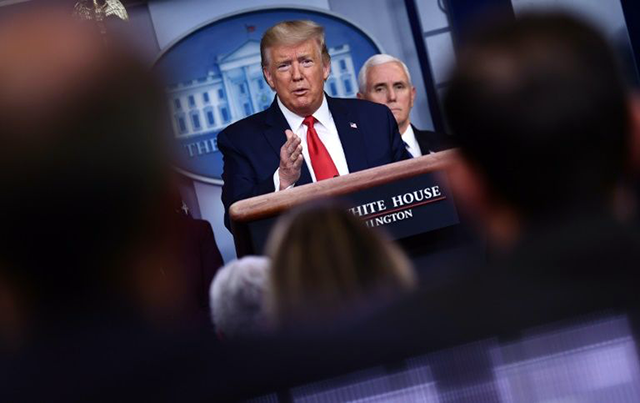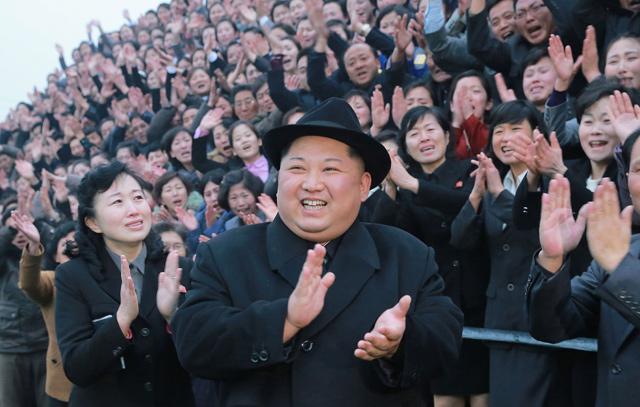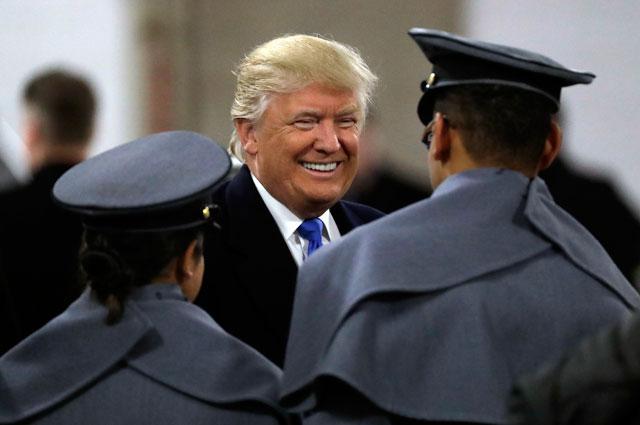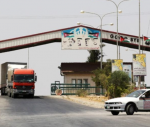You are here
Trump pivots to somber tone on coronavirus — for now
By AFP - Apr 01,2020 - Last updated at Apr 01,2020
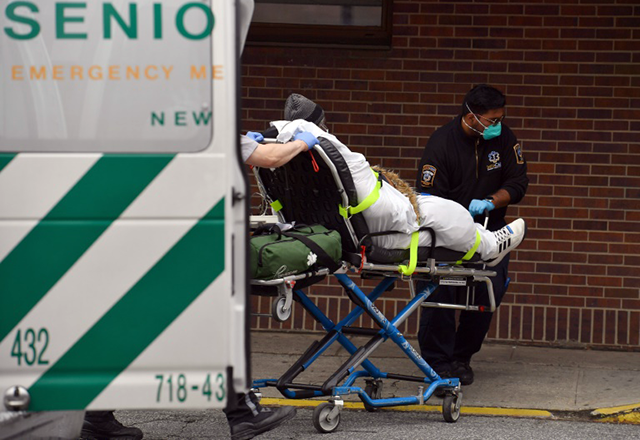
News photos from President Donald Trump's native New York seem to have hit home (AFP photo)
WASHINGTON — President Donald Trump has pivoted to a dark new tone on the coronavirus pandemic after a warning on staggering potential casualties rendered his previous election campaign optimism untenable.
At a more than two-hour White House press conference stretching into Tuesday evening, Trump expressed shock at the latest government projections in which 100,000 to 240,000 people could die, and vastly more without rigorously applied social distancing.
"We lose more here, potentially, than you lose in world wars as a country," Trump said, steeling the United States for a "very, very painful" two weeks ahead.
The blunt warning, delivered in a voice at times reflecting amazement and at others horror, acknowledged what government scientists like infectious diseases specialist Anthony Fauci have been saying consistently for weeks -- that a massive health crisis is underway.
But for Trump, the press conference marked a turning point -- the latest of many.
In his daily briefings and tweet storms, he has veered dizzyingly between dismissing the danger, scrambling to protect the economy ahead of the election, squabbling with Democratic opponents, praising opponents, and declaring himself the nation's unifying leader.
Only a week ago, Trump was touting an end to social distancing measures and reopening of the country so that Americans celebrate Easter, on April 12, in "packed churches".
"I just think it'll be a beautiful timeline," he answered when asked by reporters what the medical justification was for such a quick lifting of anti-coronavirus measures.
By last Sunday, Trump had pivoted: he was extending the national shutdown by a month.
That vision of crowded churches celebrating an end to the pandemic? It was merely "aspirational".
Getting personal
Trump's daily briefings and frequent lengthy interviews on the friendly Fox News network dominate news coverage of the crisis.
This gives him a crushing advantage over his isolated Democratic rival Joe Biden, who is socially distancing himself at his Delaware home.
Top scientists are on hand during press conferences to give the latest hard information, while Trump offers enthusiastic Republican followers an echo of his Make America Great Again rallies -- complete with insults against journalists and opponents, jokes, and heady promises.
As Trump himself has boasted, the briefings are watched by millions.
Where Trump has rarely ventured, though, is into crisis leaders' traditional attempts to express empathy.
That changed on Tuesday.
Beyond the startling numbers of possible dead, what seemed to have hit Trump were television images of mobile morgues in his native New York, the pandemic's epicenter in the United States.
Several times he referred to news footage from a Queens borough hospital.
"I grew up right next to it," he said.
"To see the scenes of trailers out there, what they're doing with those trailers -- they're freezers and no one can even believe it," he said.
"I watched the doctors and the nurses going into that, walking into that hospital this morning. It's like military people going into battle."
He recounted seeing "friends that go into the hospital and you say 'how is he doing?' Two days later, they say 'sir, he's unconscious or he's in a coma'".
Not the first time
This is not the first time Trump has put on the mantle of strong, realistic president -- and whether the solemn tone will last is an open question.
Back on March 18 he declared himself "a wartime president" in a "very tough situation".
That was after weeks of downplaying coronavirus, which Trump insisted was no worse than regular flu -- a stance he dizzyingly disavowed in Tuesday's briefing.
Trump's previous shift to a "war" footing reflected dismal data coming in from the scientists.
Headlines at the time said Trump "gets real", that he was "chastened" and "somber".
But his "aspirational" idea of reopening by Easter -- abruptly announced, then equally abruptly ditched -- was just one week away.
Related Articles
WASHINGTON - President Donald Trump is increasingly sure Joe Biden will be his Democratic challenger, but coronavirus is already the more da
WASHINGTON — Kim Jong-un has been accused of executing generals, murdering relatives, presiding over global criminal operations and has thre
WASHINGTON — President-elect Donald Trump dismissed a brewing storm over Russian cyber meddling in the US election, rejecting as "ridiculous


